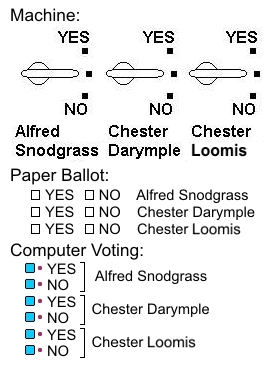HOW ONE BAD CANDIDATE KEEPS
OTHERS FROM BEING ELECTED
When the top candidate on the ballot of one party is discredited, it causes most of the
other candidates on that party's ticket to lose, even though there is nothing wrong with
those candidates. Some of it is due to adverse publicity about the party, but there is
another insidious factor that steals votes from candidates who did nothing wrong:
The problem is the straight-party device. This is a device the parties want on the
ballot that lets a voter vote for every candidate one party has on the ticket. But this
causes the following election biases.

pinball voting
How can we get rid of this voting bias?
- There is only one way:
- Require the voter to vote on each race separately.
There is only one way to make this happen:
- Voting on one candidate must not be interlocked with the voting
on other candidates.
- Voting on one candidate must not be interconnected with the
voting on other races.
How can this be achieved?
- Two things must be done:
- The Plurality Voting System (vote for only one) used in most places must be
permanently abolished.
- The Independent Voting System (vote on each choice
separately) must be adopted into law.
- Straight-party voting must be totally abolished. It is unfair.
How does this work?

Independent Voting
- The voter has 3 choices for each candidate: YES, NO, and ABSTAIN.
- The default if the voter does nothing is always ABSTAIN.
- On a lever machine, a three position control is used for each candidate (at right).
- Each paper ballot candidate has YES and NO check boxes.
- Checking neither or both check boxes is ABSTAIN.
- Computer ballots, like paper ballots, would have YES and NO buttons for each
candidate.
- There is no interlocking of votes between candidates.
- There is no shortcut that votes for many candidates.
- The voter can vote for as many candidates as he wants.
- The voter can vote against as many candidates as he wants.
- The voter can abstain on as many candidates as he wants.
- A vote against a candidate has the same weight as a vote for that candidate has.
- Each candidate's score is his YES votes minus his NO votes.
- The candidate with the highest positive score wins.
With the Plurality Voting System, a vote with no YES vote for an office is not
counted at all.
With the Independent Voting System, all votes except ABSTAIN votes are counted:
- Voting NO for one candidate does not mean that the voter must vote YES for another.
- Any voter can any way he wants. No combination of votes disqualifies the ballot.
- No candidate gains any YES votes because one candidate gets more NO votes.
- The voter does not have to vote against one candidate to vote for another candidate.
- No vote splitting takes place.
- No straight-party vote shortcut takes place. All votes require thought.
Thus, the Independent Voting System encourages voting on all races because it is much
fairer.
LINKS:

